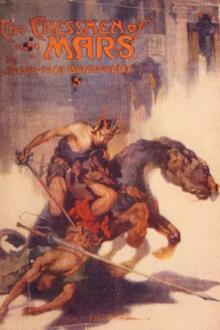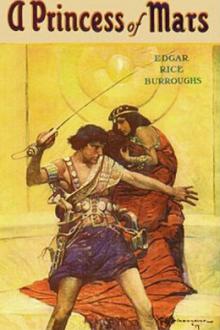The Chessmen of Mars - Edgar Rice Burroughs (free novel 24 .TXT) 📗

- Author: Edgar Rice Burroughs
- Performer: 0441061702
Book online «The Chessmen of Mars - Edgar Rice Burroughs (free novel 24 .TXT) 📗». Author Edgar Rice Burroughs
To the red man food and water, even in the citadel of an enemy, meant food and drink for Tara of Helium. He would accept it from friends or he would take it from enemies. Just so long as it was there he would have it—and there was shown the egotism of the fighting man, though Turan did not see it, nor Tara who came from a long line of fighting men; but Ghek might have smiled had he known how.
Turan permitted the flier to drift closer behind the screening hills, and then when he could advance no farther without fear of discovery, he dropped the craft gently to ground in a little ravine, and leaping over the side made her fast to a stout tree. For several moments they discussed their plans—whether it would be best to wait where they were until darkness hid their movements and then approach the city in search of food and water, or approach it now, taking advantage of what cover they could, until they could glean something of the nature of its inhabitants.
It was Turan's plan which finally prevailed. They would approach as close as safety dictated in the hope of finding water outside the city; food, too, perhaps. If they did not they could at least reconnoiter the ground by daylight, and then when night came Turan could quickly come close to the city and in comparative safety prosecute his search for food and drink.
Following the ravine upward they finally topped the summit of the ridge, from which they had an excellent view of that part of the city which lay nearest them, though themselves hidden by the brush behind which they crouched. Ghek had resumed his rykor, which had suffered less than either Tara or Turan through their enforced fast.
The first glance at the city, now much closer than when they had first discovered it, revealed the fact that it was inhabited. Banners and pennons broke from many a staff. People were moving about the gate before them. The high white walls were paced by sentinels at far intervals. Upon the roofs of higher buildings the women could be seen airing the sleeping silks and furs. Turan watched it all in silence for some time.
"I do not know them," he said at last. "I cannot guess what city this may be. But it is an ancient city. Its people have no fliers and no firearms. It must be old indeed."
"How do you know they have not these things?" asked the girl.
"There are no landing-stages upon the roofs—not one that can be seen from here; while were we looking similarly at Helium we would see hundreds. And they have no firearms because their defenses are all built to withstand the attack of spear and arrow, with spear and arrow. They are an ancient people."
"If they are ancient perhaps they are friendly," suggested the girl. "Did we not learn as children in the history of our planet that it was once peopled by a friendly, peace-loving race?"
"But I fear they are not as ancient as that," replied Turan, laughing. "It has been long ages since the men of Barsoom loved peace."
"My father loves peace," returned the girl.
"And yet he is always at war," said the man.
She laughed. "But he says he likes peace."
"We all like peace," he rejoined; "peace with honor; but our neighbors will not let us have it, and so we must fight."
"And to fight well men must like to fight," she added.
"And to like to fight they must know how to fight," he said, "for no man likes to do the thing that he does not know how to do well."
"Or that some other man can do better than he."
"And so always there will be wars and men will fight," he concluded, "for always the men with hot blood in their veins will practice the art of war."
"We have settled a great question," said the girl, smiling; "but our stomachs are still empty."
"Your panthan is neglecting his duty," replied Turan; "and how can he with the great reward always before his eyes!"
She did not guess in what literal a sense he spoke.
"I go forthwith," he continued, "to wrest food and drink from the ancients."
"No," she cried, laying a hand upon his arm, "not yet. They would slay you or make you prisoner. You are a brave panthan and a mighty one, but you cannot overcome a city singlehanded."
She smiled up into his face and her hand still lay upon his arm. He felt the thrill of hot blood coursing through his veins. He could have seized her in his arms and crushed her to him. There was only Ghek the kaldane there, but there was something stronger within him that restrained his hand. Who may define it—that inherent chivalry that renders certain men the natural protectors of women?
From their vantage point they saw a body of armed warriors ride forth from the gate, and winding along a well-beaten road pass from sight about the foot of the hill from which they watched. The men were red, like themselves, and they rode the small saddle thoats of the red race. Their trappings were barbaric and magnificent, and in their head-dress were many feathers as had been the custom of ancients. They were armed with swords and long spears and they rode almost naked, their bodies being painted in ochre and blue and white. There were, perhaps, a score of them in the party and as they galloped away on their tireless mounts they presented a picture at once savage and beautiful.
"They have the appearance of splendid warriors," said Turan. "I have a great mind to walk boldly into their city and seek service."
Tara shook her head. "Wait," she admonished. "What would I do without you, and if you were captured how could you collect your reward?"
"I should escape," he said. "At any rate I shall try it," and he started to rise.
"You shall not," said the girl, her tone all authority.
The man looked at her quickly—questioningly.
"You have entered my service," she said, a trifle haughtily.
"You have entered my service for hire and you shall do as I bid you."
Turan sank down beside her again with a half smile upon his lips. "It is yours to command, Princess," he said.
The day passed. Ghek, tiring of the sunlight, had deserted his rykor and crawled down a hole he had discovered close by. Tara and Turan reclined beneath the scant shade of a small tree. They watched the people coming and going through the gate. The party of horsemen did not return. A small herd of zitidars was driven into the city during the day, and once a caravan of broad-wheeled carts drawn by these huge animals wound out of the distant horizon and came down to the city. It, too, passed from their sight within the gateway. Then darkness came and Tara of Helium bid her panthan search for food and drink; but she cautioned him against attempting to enter the city. Before he left her he bent and kissed her hand as a warrior may kiss the hand of his queen.
Turan the panthan approached the strange city under cover of the darkness. He entertained little hope of finding either food or water outside the wall, but he would try and then, if he failed, he would attempt to make his way into the city, for Tara of Helium must have sustenance and have it soon. He saw that the walls were poorly sentineled, but they were sufficiently high to render an attempt to scale them foredoomed to failure. Taking advantage of underbrush and trees, Turan managed to reach the base of the wall without detection. Silently he moved north past the gateway which was closed by a massive gate which effectively barred even the slightest glimpse within the city beyond. It was Turan's hope to find upon the north side of the city away from the hills a level plain where grew the crops of the inhabitants, and here too water from their irrigating system, but though he traveled far along that seemingly interminable wall he found no fields nor any water. He searched also for some means of ingress to the city, yet here, too, failure was his only reward, and now as he went keen eyes watched him from above and a silent stalker kept pace with him for a time upon the summit of the wall; but presently the shadower descended to the pavement within and hurrying swiftly raced ahead of the stranger without.
He came presently to a small gate beside which was a low building and before the doorway of the building a warrior standing guard. He spoke a few quick words to the warrior and then entered the building only to return almost immediately to the street, followed by fully forty warriors. Cautiously opening the gate the fellow peered carefully along the wall upon the outside in the direction from which he had come. Evidently satisfied, he issued a few words of instruction to those behind him, whereupon half the warriors returned to the interior of the building, while the other half followed the man stealthily through the gateway where they crouched low among the shrubbery in a half circle just north of the gateway which they had left open. Here they waited in utter silence, nor had they long to wait before Turan the panthan came cautiously along the base of the wall. To the very gate he came and when he found it and that it was open he paused for a moment, listening; then he approached and looked within. Assured that there was none within sight to apprehend him he stepped through the gateway into the city.
He found himself in a narrow street that paralleled the wall. Upon the opposite side rose buildings of an architecture unknown to him, yet strangely beautiful. While the buildings were packed closely together there seemed to be no two alike and their fronts were of all shapes and heights and of many hues. The skyline was broken by spire and dome and minaret and tall, slender towers, while the walls supported many a balcony and in the soft light of Cluros, the farther moon, now low in the west, he saw, to his surprise and consternation, the figures of people upon the balconies. Directly opposite him were two women and a man. They sat leaning upon the rail of the balcony looking, apparently, directly at him; but if they saw him they gave no sign.
Turan hesitated a moment in the face of almost certain discovery and then, assured that they must take him for one of their own people, he moved boldly into the avenue. Having no idea of the direction in which he might best hope to find what he sought, and not wishing to arouse suspicion by further hesitation, he turned to the left and stepped briskly along the pavement with the intention of placing himself as quickly as possible beyond the observation of those nocturnal watchers. He knew that the night must be far spent; and so he could not but wonder why people should sit upon their balconies when they should have been asleep among their silks and furs. At first he had thought them the late guests of some convivial host; but the windows behind them were shrouded in darkness and utter quiet prevailed, quite upsetting such





Comments (0)